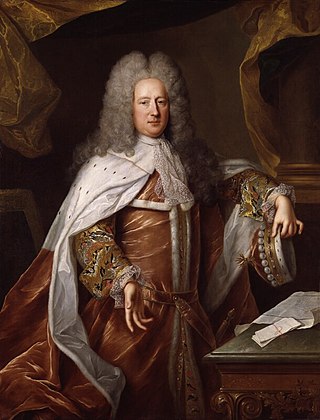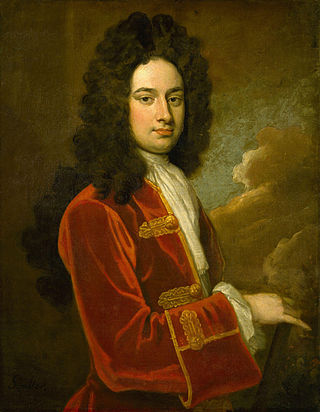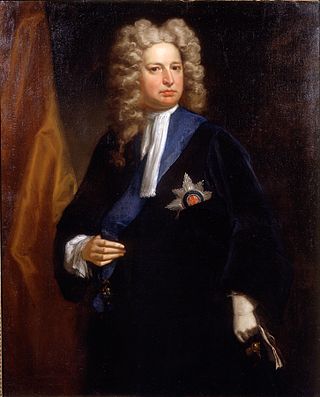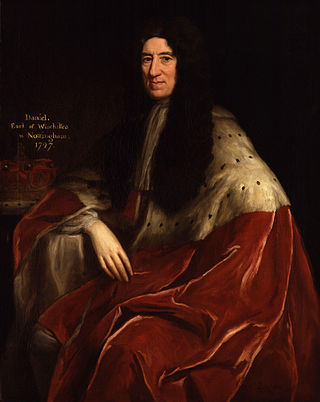Related Research Articles

Jonathan Swift was an Anglo-Irish satirist, author, essayist, political pamphleteer, poet, and Anglican cleric who became Dean of St Patrick's Cathedral, Dublin, hence his common sobriquet, "Dean Swift".
The Whigs were a political party in the Parliaments of England, Scotland, Ireland, Great Britain and the United Kingdom. Between the 1680s and the 1850s, the Whigs contested power with their rivals, the Tories. The Whigs merged into the Liberal Party with the Peelites and Radicals in the 1850s. Many Whigs left the Liberal Party in 1886 to form the Liberal Unionist Party, which merged into the Conservative Party in 1912.

Henry St John, 1st Viscount Bolingbroke was an English politician, government official and political philosopher. He was a leader of the Tories, and supported the Church of England politically despite his antireligious views and opposition to theology. He supported the Jacobite rebellion of 1715 which sought to overthrow the new king George I. Escaping to France he became foreign minister for James Francis Edward Stuart. He was attainted for treason, but reversed course and was allowed to return to England in 1723. According to Ruth Mack, "Bolingbroke is best known for his party politics, including the ideological history he disseminated in The Craftsman (1726–1735) by adopting the formerly Whig theory of the Ancient Constitution and giving it new life as an anti-Walpole Tory principle."

William Wyndham Grenville, 1st Baron Grenville, was a British Pittite Tory politician who served as Prime Minister of the United Kingdom from 1806 to 1807, but was a supporter of the Whigs for the duration of the Napoleonic Wars. As prime minister, his most significant achievement was the abolition of the slave trade in 1807. However, his government failed to either make peace with France or to accomplish Catholic emancipation and it was dismissed in the same year.

James Stanhope, 1st Earl Stanhope was a British Army officer, politician, diplomat and peer who effectively served as Chief Minister between 1717 and 1721. He was also the last Chancellor of the Exchequer to sit in the House of Lords.

Francis Atterbury was an English man of letters, politician and bishop. A High Church Tory and Jacobite, he gained patronage under Queen Anne, but was mistrusted by the Hanoverian Whig ministries, and banished for communicating with the Old Pretender in the Atterbury Plot. He was a noted wit and a gifted preacher.

Robert Harley, 1st Earl of Oxford and Earl Mortimer, KG PC FRS was an English statesman and peer of the late Stuart and early Georgian periods. He began his career as a Whig, before defecting to a new Tory ministry. He was raised to the peerage of Great Britain as an earl in 1711. Between 1711 and 1714 he served as Lord High Treasurer, effectively Queen Anne's chief minister. He has been called a prime minister, although it is generally accepted that the de facto first minister to be a prime minister was Robert Walpole in 1721.

Simon Harcourt, 1st Viscount Harcourt, PC of Stanton Harcourt, Oxfordshire, was an English Tory politician who sat in the English and British House of Commons from 1690 until 1710. He was raised to the peerage as Baron Harcourt in 1711 and sat in the House of Lords, becoming Queen Anne's Lord High Chancellor of Great Britain. He was her solicitor-general and her commissioner for arranging the union with Scotland. He took part in the negotiations preceding the Peace of Utrecht.
The Tories were a loosely organised political faction and later a political party, in the Parliaments of England, Scotland, Ireland, Great Britain and the United Kingdom. They first emerged during the 1679 Exclusion Crisis, when they opposed Whig efforts to exclude James, Duke of York from the succession on the grounds of his Catholicism. Despite their fervent opposition to state-sponsored Catholicism, Tories opposed his exclusion because of their belief that inheritance based on birth was the foundation of a stable society.

General Richard Savage, 4th Earl Rivers PC was an English nobleman and soldier who was a senior Army officer in the English and then British Army. The second son of Thomas Savage, 3rd Earl Rivers and his first wife Elizabeth Scrope, Savage was styled Viscount Colchester after the death of his elder brother Thomas in 1680, he was designated by that title until he succeeded to the peerage upon the death of his father, the 3rd Earl, in 1694. Savage served as Master-General of the Ordnance and Constable of the Tower, and was briefly commander-in-chief of the forces in lieu of James Butler, 2nd Duke of Ormonde until his death in 1712.

Benjamin Hoadly was an English clergyman, who was successively Bishop of Bangor, of Hereford, of Salisbury, and finally of Winchester. He is best known as the initiator of the Bangorian Controversy.

Charles Davenant was an English economist, Tory politician and pamphleteer who sat in the Parliament of England representing the parliamentary constituencies of St Ives and Great Bedwyn.

George Tierney PC was an Irish Whig politician. For much of his career he was in opposition to the governments of William Pitt and Lord Liverpool. From 1818 to 1821 he was Leader of the Opposition in the House of Commons.

The 1710 British general election produced a landslide victory for the Tories. The election came in the wake of the prosecution of Henry Sacheverell, which had led to the collapse of the previous government led by Godolphin and the Whig Junto.

The Harleyministry was the British government that existed between 1710 and 1714 in the reign of Queen Anne. It was headed by Robert Harley and composed largely of Tories. Harley was a former Whig who had changed sides, bringing down the seemingly powerful Whig Junto and their moderate Tory ally Lord Godolphin. It came during the Rage of Party when divisions between the two factions were at their height, and a "paper war" broke out between their supporters. Amongst those writers supportive of Harley's government were Jonathan Swift, Daniel Defoe, Delarivier Manley, John Arbuthnot and Alexander Pope who clashed with members of the rival Kit-Kat Club.
During the early 18th century, Great Britain was undergoing a government shift into a two party system. The leading conservative political grouping, the Tories, was the primary political party, but at the turn of the 18th century the Whigs, a liberal faction, had begun to rise in influence. As the parties struggled for power in Parliament, tensions rose. When the Whig Party continued to grow in power and influence, gaining more representation in Parliament and recognition in the general public, the Tories found themselves challenged over their policies and opinions. The arguments of government went beyond the House of Parliament. Public speeches, debates, and other forms of popular influence arose, creating a new style of politics. This was the environment that Princess Anne found herself when she became Queen of England, Scotland and Ireland on 8 March 1702. Her brother-in-law, William III of England and II of Scotland, who had preceded her, had been in support of the growing two party system, and in respect, Anne "endured" the Whigs despite her personal preference for the Tory party. The tensions between the parties had escalated to the point where party members became paranoid of conspiracies and conducted plots against one another. The Whigs conspired assassination plots against important Tory figures as an attempt to make way for their policies and political agendas.
John Morphew was an English publisher. He was associated with significant literary and political publications of the early 18th century. At one point publishing for both Whig and Tory factions, he later became identified with the Tories.

Arthur Maynwaring or Mainwaring, of Ightfield, Shropshire, was an English official and Whig politician who sat in the English and British House of Commons from 1706 to 1712. He was also a journalist and a polemic political author.

The Conduct of the Allies and of the Late Ministry in Beginning and Carrying on the Present War was a book in essay-style written by Jonathan Swift, in which he attacked Britain's allies in the War of the Spanish Succession. It was published on 27 November 1711.

No Peace Without Spain was a popular British political slogan of the early eighteenth century. It referred to the ongoing War of the Spanish Succession (1701–1714) in which Britain was a leading participant. It implied that no peace treaty could be agreed with Britain's principal enemy Louis XIV of France that allowed Philip, the French candidate, to retain the Spanish crown. The term became a rallying cry for opposition to the Tory government of Robert Harley, Earl of Oxford and the terms of the Treaty of Utrecht.
References
- 1 2 Chisholm, Hugh (1911). . In Chisholm, Hugh (ed.). Encyclopædia Britannica . Vol. 19 (11th ed.). Cambridge University Press. p. 554.
- ↑ Frank H. Ellis, "Arthur Mainwaring as Reader of Swift's 'Examiner'" The Yearbook of English Studies, Vol. 11, Literature and Its Audience, II Special Number (1981), pp. 49-66
